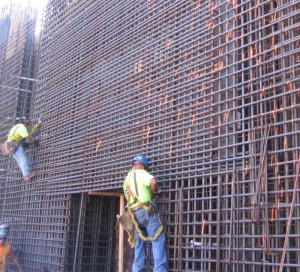Since good design is essential for efficient construction, Madison Concrete has capabilities that include engineering consulting and support to collaborate with our engineering partners.

Self-consolidating concrete was chosen as the best application for a tall wall pour with steel plates for link beams.
Our goal is not to replace the fine structural and civil engineering firms with whom we partner, rather, to make sure our team provides the right information related to the intricate details of each concrete construction project we estimate and work on so the owner is guaranteed the best outcome.
The role of Rick Stone, Madison Concrete’s in-house engineer, is to be an expert for owners, designers and construction managers related to all things concrete. Here he discusses how self-consolidating concrete differs from conventional concrete.
Q: How does self-consolidating concrete differ from conventional concrete?
A: Self-consolidating concrete (SCC) is gaining ground in this market as an alternative to traditional concrete. It can allow placement in conditions where a traditional concrete would not. For example, we used SCC mixes on a tall wall pour where a vibrator could not reach the lower sections to consolidate the concrete. For this extremely tall wall pour, SCC made it possible to place these walls higher than 60 feet in a single pour and saved time on the project. This technique is also helpful when building multi-story basement walls that would otherwise take several pours to get back to street level.
We have had to engineer our way to success, as the form pressures induced by SCC mixes have not been (and still are not) clearly understood. With the development of simple, effective measures, we can monitor stiffening and control those pressures for safe and efficient placement. However, because SCC runs like water, it is important that the formwork be built as tight as possible. We foresee many applications where SCC will be a great solution and we will continue to develop techniques for our toolbox.
We would love to hear from you about your structural engineering challenges and successes. Submit your questions to Rick Stone at rstone@madisonconcrete.com.